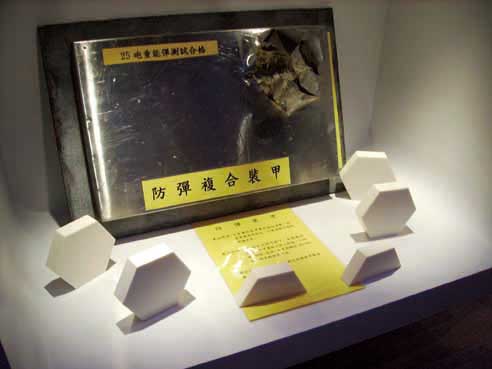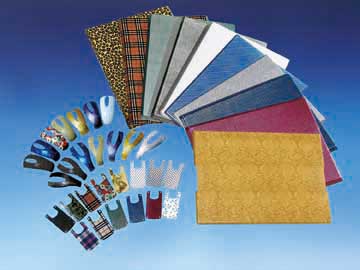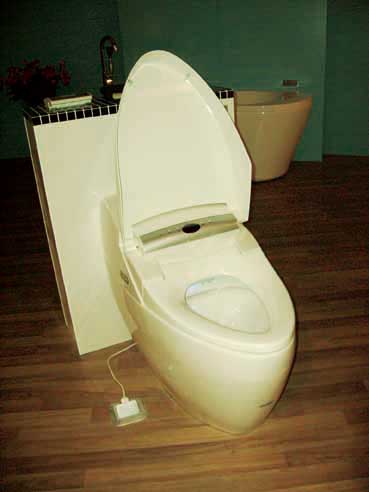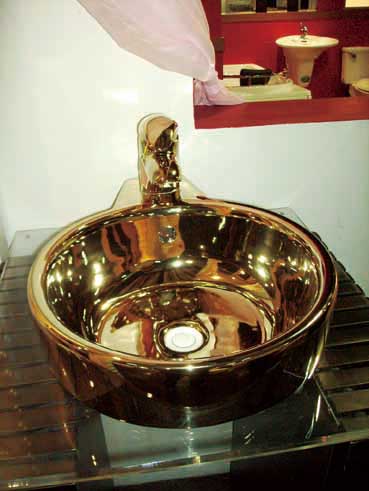HCG Sets New Course With Hi-end Ceramics and 3C Products
2008/03/04 | By Steve ChuangHocheng Corporation (HCG), Taiwan's leading maker of ceramic sanitary ware with a history of more than 70 years, is now developing high-end ceramics for military use and applying its seasoned know-how in composite materials to turn out 3C (computer, communication, and consumer-electronic) products, setting a new course for corporate growth in such promising sectors.
After experiencing a golden age in 1994, when Taiwan's sanitary ware sector generated production value of over NT$10 billion (US$307.6 million at UD$1:NT$32.5) for the year, domestic suppliers in the line have suffered from declining sales due partly to the shrinking housing market and partly to the fierce competition from Chinese rivals and major global brands.


Bulletproof, High-end Ceramics
As director of HCG's Technology Material Department, Johnson Lee is in charge of developing high-end ceramics and high-tech materials. He noted that HCG has invested heavily in research on high-tech, precision ceramics, such as multi-layer ceramic capacitors (MLCCs) for 25 years. One of the achievements of this work is the development of highly profitable bulletproof ceramics.
HCG has cooperated with the Chung-Shan Institute of Science and Technology (CSIST), under Taiwan's Ministry of National Defense (MND), to develop the high-end ceramics, which, according to Lee, need to be heated to a temperature of up to 1,700 degrees Celsius (about 3,092 degrees Fahrenheit). Diamond cutters are also needed to slice through the tough material.

Performance of HCG's bulletproof ceramics also have been certified by H.P. White Laboratory Inc.'s NIJ tests, including the LV3 and LV4 tests, which are among the world's most credible tests for ballistic resistance requirements. According to results of the NIJ LVIII test by the lab, a bullet, with a 7.62 x 39mm caliber cannot penetrate HCG's tested bulletproof ceramics, including its 0.61-inch, 5.51-lb model, 0.598-inch, 5.58-lb model, and 0.695-inch, 8-lb model.

"The ceramic protects users against bullets so there can be no defects," Lee said. "This requires relatively mature technologies and experience in the field. But the profits are also high," Lee said.
Composite Materials for 3C Products
HCG is also using composite materials to make decorative panels for use in 3C products.
Lee said that HCG has used composite materials in making bathtubs for more than 30 years, and at one time the company used 6,000 metric tons of composite materials a year. Since 2003, the company has acquired aviation technologies from the CSIST to make high-tech composite materials, including mixes of leather, artificial leather, carbon fiber or glass fiber.
HCG is the world's first supplier applying mixes of cloth in 3C products and has rolled out more than 1,000 kinds of decoration panel so far. The company also shipped 200,000 mouse covers made of composite materials to Russia.
"HCG has been approved by ISO 9001 and 14000 standards in production of such products, and it has obtained more than 16 patents on related applications in Taiwan. Also, HCG has continually upgraded its manufacturing equipment over the past 25 years or so to become a leader in this market," Lee said.
According to Lee, HCG's mouse covers made of composite materials have a 4H hardness and are more wear-resistant than other competing models. The composite material also gives the computer mice a compact, eye-catching look. The covers can retain their colors un-faded, even after one to two years of use.
Lee noted that the composite materials do not require additional processing and are more stable in quality. "It is hard to imagine that the clothing you wear every day can be easily applied in production of 3C products; but, HCG, as both a newcomer and veteran maker in the sector, makes it possible and practical," Lee said.
In recognition of its achievements in composite material applications, HCG has earned several awards from Taiwan's Ministry of Economic Affairs. The company is developing new high added-value 3C applications for composite materials, according to Lee.
Honing Core Competitiveness
While diversifying its business operations to bulletproof ceramics and composite materials, HCG is still dedicated to its core business of making sanitary ware and conventional ceramic products.
Chen Shih-chieh, director of HCG's Department of Research & Development, has been introducing nanotech ceramic technology to create a revolution in sanitary ware at the company.
At the moment, HCG commands a 55% of the Taiwanese market for sanitary and bathroom ware, and it is neck-to-neck with Japan's TOTO in sales of nanotech ceramic water closets.
Chen mentioned that HCG recently has succeeded in developing a new water closet called the "Super-lid." It has a built-in sensor that can lift and lower the toilet lid automatically when users approaches the toilet. It also has a heated seat, automatic flush, uses nanotech ceramics, and is very easy to keep clean. The high-end water closet is scheduled to be launched in early 2008.
HCG is also trying to achieve a harmonious combination of functionality, comfort, and style in its sanitary ware. "HCG wants to turn bathrooms and restrooms into a comfortable and relaxing space and foster a so-called 'bathroom culture'," Chen said.
HCG also produces large-sized ceramic building materials, such as exterior panels for kitchen cupboards and cabinets, and artistic panels that can be printed. The ceramic building materials are totally fireproof and easy to clean.
Ceramic faucets are another product offered by HCG. These items have been well received by Taiwan's hotel operators in hot spring resorts on the island since they do not rust like copper fixtures in moist environments. Ceramics-made faucets are durable and relatively hard to break, and are available in a variety of colors and exterior designs.




